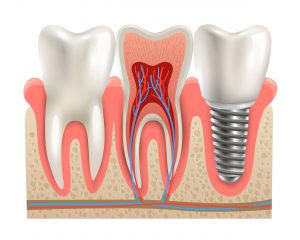Did you know that a quarter of all Brits fail to brush twice a day as recommended by the NHS? What’s worse, 1 in 10 forget to brush at all. The consequences? Poor oral hygiene leads to cavities and dental decay. If you are genetically predisposed to ailments like gum disease, this can quickly and easily deteriorate into painful and costly trips to the dentist, and ultimately tooth loss.

Unfortunately, food-borne bacteria in the oral cavity rarely stay only there if not taken care of on time. It can travel through your bloodstream and impact other organs in your body – your mouth is connected to the rest of your body. This idea was introduced more than 100 years ago by the British physician – William Hunter – who called these “focal infections”.
As a result, gum disease does not only cause your jaw bone to melt, leading to loose and wobbly teeth, but it also leads to serious diseases like diabetes, cancer and heart disease.
The good news is – most oral diseases are preventable if you are disciplined with your oral hygiene. On the other hand, if it’s too late for you and you have lost most of your teeth, you can stop the process of bone loss.
Dental implants serve as the best replacements for teeth roots. Once they are permanently embedded into the jawbone, they act just like your natural teeth. That way not only do they help restore your shattered confidence, but fixed bridges on implants allow you to eat your favourite foods with comfort again.
But, before we explore the benefits of dental implants against tooth loss, let’s learn more about gum disease. We will also see, how it can be treated and cured, and how long you can keep your teeth with periodontal disease.
Contents
What is gum disease?
 Before anything else, let’s first clarify what is the difference between gum inflammation and gum disease, and which comes first. At some point, all of us are bound to get gingivitis – gum inflammation. It has mild symptoms and can be easily overlooked. That way over time, it can bring more serious issues like acute gum disease and tooth loss as a result.
Before anything else, let’s first clarify what is the difference between gum inflammation and gum disease, and which comes first. At some point, all of us are bound to get gingivitis – gum inflammation. It has mild symptoms and can be easily overlooked. That way over time, it can bring more serious issues like acute gum disease and tooth loss as a result.
It can even make you feel sick and show common cold symptoms like chills, fever and a runny nose. Furthermore, if you neglect gum disease over an extensive period of time, it can lead to serious heart-related diseases that can actually cause death.
Still, the easiest way to prevent is oral hygiene – regular flossing, brushing your teeth and having regular checkups with your dentist every 6 months will ensure that you don’t have serious teeth problems.
Alternatively, if you miss brushing and flossing regularly, bacteria will slowly build up over your tooth surfaces and start attacking your enamel. This is your teeth’s protective outer layer. Once damaged, it results in tooth sensitivity and a weakened structure. Ultimately, that leads to fractures and ruptures.
Top 5 symptoms of gum disease
There is an old saying that you have probably heard more often than not – prevention is the best cure.
- Bleeding gums – if there is blood when you brush your teeth, this most probably means that you are already experience some gum sensitivity. This is an early symptom of gum disease.
- Receding gums – if your teeth appear taller than normal, and the tooth root has somewhat been exposed, you’re experiencing advanced symtomps of periodontitis. There is a higher risk of more serious development of the disease are the sockets that are formed under your teeth catch more food. Throughout the decay process more bacteria is formed and cause further decay.
- Loose and wobbly teeth – as a result of bacteria spread in the oral cavity pockets form underneath your teeth as a result of gum recession. This can cause teeth to move and shit around and eventually will need extraction unless the infection and gum recession process is controlled.
- Redness and swollen gums – of the symptoms of acute infection is redness and sensitivity in the gum area. The sign of healthy gum is usually a bright pink colour, so if you notice unusual changes in the way your gums look, you ought to seek dental help. Other symptoms that you may experience in the early periodontitis stage may be fever and sensitivity to touch.
- Bad breath – have you noticed that your breath smell does not improve even after you brush and use mouthwash? The issue may be bigger than naturally odorous foods. Due to bacteria accumulation in the oral cavity, you may experience persistent smells despite your best efforts to remove them with mouthwash. If that is the case, it may be worth it to look into gum disease treatment options
What causes gum disease?
Moreover, the plaque that’s been building up as a result of poor oral hygiene hardens into tartar. This makes it impossible to clean your teeth properly unless cleaned professionally by a dentist. Ultimately the buildup attacks your gums and causes serious inflammation. This is how gingivitis is formed.
If you fail to look for proper treatment, to make things worse, gingivitis will develop into periodontitis and will cause your jaw bone to melt and your gums to pull away and cause small gaps. Those small gaps can collect food remnants which in turn bring more bacteria, once they start decaying.
As gum disease progresses, your teeth are no longer in their original place, meaning they will become loose, which ultimately ends up in losing them. And this is how gum disease becomes the number one reason for tooth loss among adults.
5 tips to prevent gum disease
If you want to know how to cure gum disease without a dentist – your best strategy will always be prevention! It will save you tons of money, pain and timely visits to the dentist.
If you are determined to prevent gum disease naturally and avoid poor habits that cause it, here is what you can do:
- Tobacco and tobacco products – frequent tobacco use massively increases the risk of gum disease, and what’s more, it impairs treatment results.
- Diabetes – it varies between the level of control. If you have a case of uncontrolled diabetes, this promotes rapid bacteria growth and development, which in turn elevates the risk of gum disease
- Vaping – it affects negatively the healthy saliva amounts in your mouth. Saliva is responsible for neutralising harmful acids in your oral cavity. As a result, vaping can cause plaque buildup, and bacteria growth, which left untreated promotes gingivitis and gum disease.
- Alcohol – similar to vaping, alcohol compromises a healthy amount and severely impacts the salivary gland’s function. That way saliva can’t properly wash away harmful bacteria and exposes you to a high risk of developing cavities, decay, and other serious oral disease issues.
As a part of a healthy oral disease prevention strategy, apart from avoiding poor habits, you can pay close attention to your diet and nutrition. If you want to deal with disease and tooth loss and have healthy bones, check which are the best vitamins and minerals for oral health.
How to replace teeth lost through gum disease
If you have already suffered from severe gum disease and you have already lost the majority of your teeth as a result of it, you can consider looking into long-term solutions for tooth loss. You may not be able to have dental implants with receding gums and bad gum disease, which is why you first need to take control of your oral health firsts.
Before considering all-on-4 dental implants it’s important to ensure there will be a healthy oral environment for them, otherwise, you risk implant failure. First and foremost, you’d need to reconsider changing your old poor oral health habits and replace them with proper nutrition to make sure you restore your oral health properly.
 Once you have been to do so, you can proceed with your dental implant consultation and treatment. Although you may have experienced severe bone loss while suffering from gum disease, once treated you’d be able to get dental implants and new fixed teeth over them. The good news is that dental implants mimic the natural tooth root. So, after the dental implants are firmly placed into the jaw bone, the bone loss process with stop and your face will look younger because its shape will be restored.
Once you have been to do so, you can proceed with your dental implant consultation and treatment. Although you may have experienced severe bone loss while suffering from gum disease, once treated you’d be able to get dental implants and new fixed teeth over them. The good news is that dental implants mimic the natural tooth root. So, after the dental implants are firmly placed into the jaw bone, the bone loss process with stop and your face will look younger because its shape will be restored.
If you are looking for more budget-friendly replacements for missing teeth, removable dentures may be an alternative option. However, there are a few downsides to dentures in terms of functionality, durability and long-term comfort. The most important one is – dentures lay on top of the gums, they do not have any impact on bone loss as a result of gum disease. That means, the more time you remain without teeth or implants to replace the natural tooth root, the more your jaw bone will disappear and impact the way your face looks.
Bringing it all together
There is undisputable evidence of the mouth-body connection, which is why we need to pay close attention to our oral health if we want to take good care of our overall health as well. Dental implants can have positive impact on your overall quality of life by improving long-term comfort and bootsting your confidence if you have lost your teeth as a result of gum disease. But, they can only do as much – if you have been toothless as a result of serious oral disease, let this serve as a wake up call and motivate you to rely on good prevention and proper care. Make sure you rely on proper nutrition and don’t miss your regular dental checkups to stay happy and healthy.



